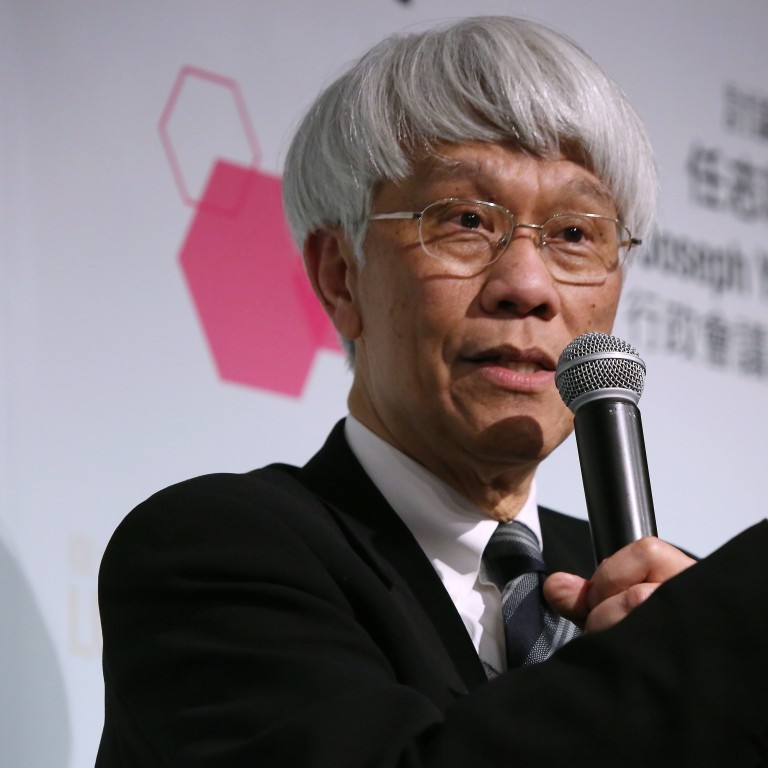
HKMA has power to change Tracker Fund manager to get round US sanctions, Hong Kong leaders say
- Calls for a new manager came after incumbent State Street Global said it must fall in line with US sanctions on certain Chinese firms, potentially harming small investors
- The sanctions mean the manager will not be able to track the Hang Seng Index and is no longer fit for duty, says former HKMA head Joseph Yam
Hong Kong’s financial regulator has the power to change the manager of the city’s Tracker Fund to safeguard the interests of retail investors and pensioners facing potential losses after the US sanctioned certain Chinese companies, Chief Executive Carrie Lam Cheng Yuet-ngor said on Tuesday.
That meant it would not be able to continue tracking the strong performance of the Hang Seng Index, analysts warned, potentially harming the investments of some 184,000 Hong Kong retail investors as well as pension funds that rely on it.
However, the Hong Kong Monetary Authority, the city’s de facto central bank, has some remaining influence that may allow it to appoint a different manager of the Tracker Fund, Lam told the media on Tuesday morning.
“The details are to be decided by the HKMA and the relevant supervisory committee,” she said.
This raises the prospect of replacing State Street Global with a manager that is not subject to US law.
Cabinet member and former HKMA chief executive Joseph Yam Chi-kwong, who introduced the Tracker Fund in 1999, supports the idea of a change of manager.
Since its set-up 21 years ago, a six-member supervisory committee has met at quarterly intervals to oversee the Tracker Fund. That supervision includes the power to change its manager, according to the prospectus of the fund.
This power derives from the fact the Tracker Fund, which has an investment portfolio worth HK$105.3 billion (US$13.6 billion), is not an ordinary fund product. It was set up by the Exchange Fund Investment under the HKMA to dispose of government equity holdings built up through market interventions to arrest the slump caused by the Asian financial crisis of 1998.
“The supervisory committee has contacted the fund managers to study the impact [of the US sanctions] and to see if it needs to take any measures,” a spokesman for the HKMA said in response to a Post enquiry.
Committee members include Romnesh Lamba, the co-head of Hong Kong Exchanges and Clearing’s market development division, as well as veteran fund manager Blair Pickerell.
The Post tried to contact both members, as well as State Street but they were not available for comment.
“There is a supervisory committee which has the power to change both [trustee and manager], and it should now do so, picking a non-US manager and trustee,” wrote shareholder activist David Webb on his website. “Until then, the HK$105 billion fund will struggle to track the Hang Seng Index.”
The Tracker Fund’s popularity rests on the fact it is simple to trade, it is cheap and because it tracks the Hang Seng Index.
The Hong Kong retail investors that bought the fund at HK$11.5 per share at its initial public offering in 1999 will have more than doubled their money as of Tuesday, when the fund closed at HK$28.4. Moreover, the city’s 12 Mandatory Provident Fund investment funds use the Tracker Fund to make investment decisions, making it the most widely held investment by Hongkongers.
A spokeswoman for the pension regulator, the Mandatory Provident Fund Schemes Authority, said it is closely monitoring the situation.
The decision by State Street came after several Wall Street investment banks – Goldman Sachs, Morgan Stanley and JPMorgan – decided on Sunday to also delist 484 warrants and other derivative products tied to China Mobile, China Unicom and China Telecom, three of the Chinese entities targeted by the November 12 executive order, from the Hong Kong stock exchange.
The Tracker Fund owns a HK$2.4 billion stake in China Mobile and HK$253 million worth of shares in China Unicom, according to the latest holdings published on its website. The two Chinese telecoms giants command a combined 3.45 per cent weighting on the Hang Seng Index. It does not own any China Telecom stock, which is not a benchmark constituent.
“Changing the manager is the right way forward. If the current fund manager cannot fulfil its duty to track the Hang Seng Index, it should allow other managers such as a local Hong Kong bank or fund company, to takeover,” said Kenrick Chung, general manager of employee benefits at Realife Insurance Brokers, who is an expert on the MPF scheme.

